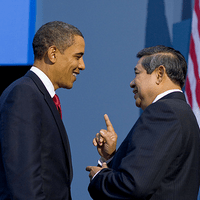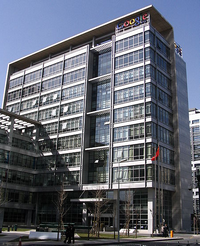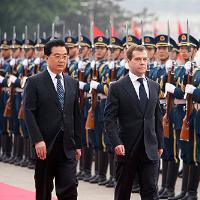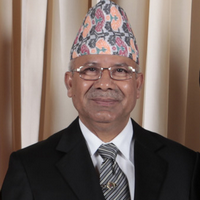Here are a few of this week’s highlights from WPR’s video section: – This Al Jazeera video breaks the story that Taliban leaders held a secret meeting in the Maldives to discuss Afghan President Hamid Karzai’s reintegration plan. – Two members of the Russian media discuss perceptions of President Barack Obama in Russia as well as U.S.-Russia relations in this WorldFocus video. -Secretary of State Hillary Clinton’s Internet freedom speech at the Newseum raised eyebrows in China.Our video sectionis updated daily. I’ll highlight videos we post there from time to timeon this blog. Got a tip for where we can […]
China Archive
Free Newsletter
In the final installment of a WorldFocus series entitled “Obama and theWorld,” Daljit Dhaliwal speaks with Adam Segal, senior fellow at theCouncil on Foreign Relations and John Delury, associate director of theCenter for U.S.-China Relations at the Asia Society about Sino-American relations. Both expertsagreed that the “China threat” has been widely over-exaggerated andthat the world’s most populous nation still has many weaknesses.However both also agree that these weaknesses will not stop thejuggernaut from rapidly growing.
Most of the comments I’ve seen on the draft QDR that Defense News obtained have focused on the so-called demise of the two-war force construct. But that seems to be more a question of semantic shift than fundamental change. What I found more interesting is the priority upgrade given to operating in anti-access environments. Certainly Iran would qualify under that rubric, and even more so if they ever actually receive the S300 air defense systems they signed a contract with Russia for. But anti-access is pretty much another way of saying China. So it’s no surprise that the section devoted […]

DENPASAR, Indonesia — Under the leadership of President Susilo Bambang Yudhoyono, U.S.-Indonesia ties have progressively strengthened since he first took office in 2004. Yudhoyono earned a masters degree in the U.S. and has never hidden his liking for the States. So it came as no surprise when, in November 2008, the former general-turned-president called for a U.S.-Indonesia strategic partnership, later renamed a comprehensive partnership. The move was in turn welcomed by U.S. President Barack Obama, who himself is sentimentally attached to the archipelagic nation where he spent a part of his childhood. Soon after Obama’s inauguration, U.S. Secretary of State […]
Secretary of State Hilary Clinton spoke about the importance ofInternet freedom at the Newseum in Washington D.C. This talk comes onthe heels of Google’s run-in with the Chinese government and theirsubsequent threat to pull their products out of the country. In herspeech, Clinton identifies China, Tunisia and Uzbekistan as countriesthat have recently tightened their control over the Internet.
It is no surprise that China has risen to economic preeminence, but thequestion remains, will it be able to keep up the pace? WorldFocus’Martin Savidge interviews the New York Times’ International BusinessEditor Marcus Mabry. Mabry says that the Chinese stimulus package, similar to the U.S.stimulus package, has largely been more effective than its U.S.counterpart because lenders have been instructed to lend money toindividuals and companies versus banks holding onto the money to recouplosses. That being said, there are talks of a possible real estatebubble in China, but Mabry says that no one will ever know until it’stoo late.
There’s been a lot of speculation about the mid- to long-term impact on U.S. foreign policy of the Haiti earthquake and America’s response to it. I was surprised to see how quickly the assumptions turned sour. Already last Friday, I participated in a France 24 program in which one analyst had already identified Haiti as a long-term — and major — problem for President Barack Obama, along the lines of waging the Afghanistan war and winding down the Iraq war. My sense is that this is a bit overblown. The unfolding operation in Haiti is a stability operation, not a […]

With 2009 and its economic woes behind them, the world’s major economies share a common goal for 2010: recovery. However, they also share a common problem that could stand in the way: China’s undervalued currency. A G-7 meeting in Canada next month looks increasingly likely to be a forum for discussing remedies for global currency imbalances, with a focus on the yuan. But can outsiders really do anything to influence China’s exchange rate? Or would a better strategy simply be to wait for Beijing to make the decision to revalue the yuan on its own? Before answering these questions, it […]
With 2009 and its year-end Top 10 lists comfortably packed away, the Carnegie Council held an event last week to usher in the New Year with a list of what to worry about in 2010. Panelists included Eurasia Group president — and WPR contributor — Ian Bremmer; the executive director of the U.N. Global Compact, Georg Kell; the editor in chief of strategy+business, Art Kleiner; and the executive director of the World Policy Institute, Michele Wucker. Bremmer kicked things off with highlights from his recently published Eurasia Group report. Here’s a sample from his overall list, with each risk weighted […]
In an illustration of the power of inertia in international relations, reports indicate that India will go ahead and ink a $1.2 billion deal for 29 Russian-made MiG-29s. The two relevant storylines here are the decline of Russia’s defense industry and India’s budding strategic (and security) relationship with the U.S. Neither was enough to derail a deal that will also create its own inertial pull well into the future. This is worth keeping in mind when contemplating scenarios involving major shifts in strategic orientations, of the kind I tend to be fascinated by — a U.S.-Iran rapprochement, an autonomous European […]

As soon as Google publicly announced on Jan. 12 that it would no longer self-censor its search engine results for Chinese users, observers debated why the company had taken such a surprising decision. Proposed explanations included recognition that Google’s presence in China has not encouraged greater media freedoms, irritation at yet another massive hacking effort by Chinese-based computers, a lack of commercial success in the large but highly competitive Chinese market, and fears about undermining faith in the security of its emerging cloud-computing networks. Now evidence has arisen about why Google executives were so alarmed: The company experienced the nightmare […]

Toward the end of World War II, the godfather of geopolitics, Nicholas Spykman, offered his famous analysis that was to become a rule of thumb for many strategists ever since: Who controls the Rimland rules Eurasia, and who rules Eurasia controls the destinies of the world. Spykman had a point. The two world wars of the 20th century came about largely due to attempts by European rivals to tilt the Eurasian balance of power in their own favor. Russia was always a critical component in this balance, but now, due to the country’s aging population and infrastructure, the 21st century […]

The leaders of the People’s Republic of China (PRC) can look forward to the new decade with considerable optimism. Last year, the PRC celebrated its 60th anniversary, with the state-controlled media taking care to trumpet the regime’s major political, economic, and military achievements. In the eyes of its leaders, the country’s rapid increase in wealth, prosperity, and prestige has, by propelling China to the forefront of global players for the first time in centuries, vindicated its present model of government, both at home and abroad. Although one can challenge that assessment, China clearly remains the world’s most populous nation and […]
Human rights advocates around the globe are cheering an announcement from Google, Inc. that it will no longer censor content in China, following a cyber attack on its infrastructure that originated there. The move could force the company’s withdrawal from the Chinese market. Google believes the goal of the attack was to access the Gmail accounts of Chinese human rights advocates. “We can only welcome the courage shown by Google’s executives. A foreign IT company . . . is standing up to the Chinese authorities, who keep clamping down more and more on the Internet,” Reporters Without Borders said in […]
Due to “cyber-attacks” on Google’s products in China, the search enginegiant is considering pulling its business from the burgeoning consumermarket. The move, rare for a multi-national company, is rooted inGoogle’s suspicions of the Chinese government’s involvement in therecent attacks. In addition to possibly pulling out of Chinaaltogether, Google says it will no longer filter its search results forChinese users as it has done in the past.

Bereft of an ally since the collapse of monarchical rule in Nepal nearly four years ago, China has been struggling to secure its place in the buffer state, wedged between China’s volatile Tibet region and its regional rival, India. Hardly a month goes by now without a high-level Chinese delegation arriving in Kathmandu seeking assurances on its security interests. In February 2005, China offered then-King Gyanendra a lifeline by calling his seizure of power, which otherwise prompted widespread international condemnation, an internal matter. A year later, when the royal regime no longer seemed tenable, China scrambled to build ties with […]

Just 12 days into 2010, Chinese government representatives have already made more than a half-dozen official statements warning the Obama administration against selling additional weapons to Taiwan. The People’s Republic of China (PRC) may respond in several ways to the announced sales, with the freezing of Sino-American military relations likely to be one means of retaliation. The Obama administration should accept a temporary suspension to educate Chinese policymakers that the defense dialogue is not something that Beijing can employ as a source of leverage over Washington. The immediate catalyst for Beijing’s anger came on Dec. 23, when the Defense Department […]
